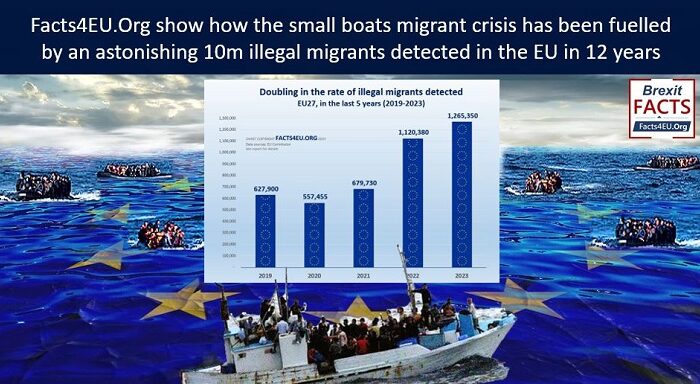‘The future of Brexit’

Labour would be mad to jettison Brexit and throw in its lot with the EU according to Robert Lee, writer and economic consultant in an affiliate article which we publish in full below.
Given the perilous economic and political outlook abroad and the urgent domestic challenges at home the likelihood of the UK rejoining the EU any time soon is extremely unlikely.
“The new government has a freakishly large parliamentary majority but was elected with only 33.7% of the votes cast in a low turnover election. Will it waste what political capital it has on a highly divisive and hopeless quest to rejoin the EU, which would do little or nothing to boost economic growth? It is no accident that the Labour manifesto explicitly rules out any attempt to join the single market or customs union.”
This government knows the EU is in deep political and economic trouble and like its predecessor is now looking to strengthen trade relationships further afield to compensate. It supports the Trans-Pacific trade agreement (CPTPP) and is in the process of exploring a trade deal with India.
As the author concludes “by pragmatically adapting to reality, and prioritising economic growth over ideology, this Labour government will end up – unintentionally – cementing Brexit’s permanence.”
Is Brexit Safe Under Labour?
by Robert Lee
Rather than being a threat to Brexit, the change of government in the UK is more likely to demonstrate its permanence. The mood music will improve, but changes to the EU/UK relationship may be largely cosmetic. The EU faces continued stagnation at best, and collapse at worst, so the Labour government’s desperate search for sources of economic growth should compel them to utilise Brexit freedoms.
The biggest test for Brexit was always going to be the election of a government dominated by Remainers. It is understandable that some Brexiteers fear that the long-desired restoration of national independence may now be reversed. This article argues that these fears are misplaced. Compelling and intertwined political and economic forces suggest that instead Brexit will prove to have been permanently cemented. What are these forces?
The need for higher economic growth
On its own analysis the incoming government faces enormous challenges – including a “broken” NHS, declining public sector productivity, an ageing population, growing numbers on long term sick leave, a rising backlash against high immigration, excessive government debt and a record tax burden – which cannot realistically be overcome without sustained higher economic growth. Ironically, this was the argument that won Liz Truss the Prime Ministership, and although she disastrously failed on implementation this thesis is now central to the Starmer/Reeves strategy.
The new government has a freakishly large parliamentary majority but was elected with only 33.7% of the votes cast in a low turnover election. Will it waste what political capital it has on a highly divisive and hopeless quest to rejoin the EU, which would do little or nothing to boost economic growth? It is no accident that the Labour manifesto explicitly rules out any attempt to join the single market or customs union.
Although Kier Starmer says that Labour will “improve” the existing Brexit trade deal with the EU that was supposedly “botched” by Boris Johnson, such improvements can only be marginal. That deal, the Trade and Cooperation Agreement, is the only entirely tariff free and quota free trade deal the EU has ever granted.
UK – EU trade post-Brexit
Catherine Mcbrides’ superb analyses of trade data (see her recent articles on this website) show that as a result there has been no discernible damage to EU/UK trade from Brexit. Overall, UK exports have grown strongly since Brexit, particularly in services, so much so that over this time the UK has moved from being the 7th largest global exporter to the 4th largest – overtaking France, Japan and the Netherlands in the process.
EU in deep trouble
Labour’s leadership will be reluctant to say so, but they must know that the EU is in deep political and economic trouble. Germany has been the dominant EU economy, but its economic model – based on cheap energy from Russia and capital exports to China – has irretrievably broken down and it has much weakened political leadership.
France is bitterly divided politically, with a lame duck President and alarmingly weak and rapidly deteriorating public finances. The economic policies on offer in France vary only in their degree of fiscal recklessness and unsustainability. Italy has been stagnating for decades and the EU funds that have propped it up cannot now be sustained. Many EU nations, most notably Germany, Italy, and Spain are in the early stages of an unstoppable demographic collapse.
The EU Commission’s regulatory machine continues to stifle innovation and economic dynamism. It makes no sense to base a growth strategy on much closer relations with a sick and possibly dying institution. The EU has in any case made it very clear that no meaningful trade concessions can be made in the absence of a return to free movement of labour. This is a now a political non-starter for the UK.
UK outperforms EU
Despite its undoubted weaknesses the UK economy has begun to noticeably outperform the EU. In an article last December (The UK Will Grow Faster than the EU and the US in 2024/25) I pointed out that the UK had grown faster than the EU in the years 2022 and 2023 – 4.6% growth compared to 4% – and forecast that this outperformance would continue in 2024 and 2025. So far this year this has proved the case – admittedly a short period – with the estimated growth and inflation rates for the US, UK and EU as follows:
Estimated Annualised Real Latest Inflation
GDP Growth H1 2024 Rate (May)
UK 2.5% 2.0%
US 1.5% 3.3%
EU 1.0% 2.7%
Yes, folks, the UK is growing faster than the EU, and even the US, and has a lower inflation rate than either! Does the election of a Labour government change my relatively optimistic forecasts for UK growth and inflation? Certainly not for 2024, but more time and evidence are needed to take a view beyond that.
Post-Brexit Opportunities
What evidence is there that Labour strategists recognise any of this? More than you might think. Labour supported the UK’s accession to the giant and fast growing CTPPP Asian trading bloc (soon to take effect).
Are they going to risk membership of this bloc in order to align with the EU? Or abandon the ongoing negotiations with The Gulf Cooperation Council, South Korea, Switzerland, Mexico? Tear up our new trade deals with Australia and New Zealand? Our groundbreaking digital services agreement with Singapore? Our “mini” trade agreements with seven key US states?
UK-Indian free trade negotiations
Labour also backed the UK’s free trade negotiations with India. These negotiations were close to agreement when interrupted by elections, first in India and then in the UK (why didn’t Sunak close this deal, cementing an important legacy, before calling the election?).
The new Foreign and Trade Secretaries, David Lammy and Jonathon Reynolds, travelled to India earlier this year to establish relationships with their Indian counterparts and add their support to the negotiations (suspicions were raised that they might have encouraged delay so that such a deal could be concluded by an incoming Labour government).
A comprehensive trade deal with India is a much more attractive growth proposition than closer EU ties, given India’s much higher sustainable growth rate, rapidly growing middle class and existing high tariffs and restrictions on UK exports.
Lammy in discussions with Trump advisors on US-UK trade deal
More surprising are reliable reports that in May this year Lammy and senior Labour figures held intensive and friendly discussions with senior advisers to Donald Trump. Trump’s blueprint for a second presidency is called Project 2025 and includes the following intriguing statement “trade with post-Brexit UK needs urgent development before London slips back into the orbit of the EU”.
According to these reports Labour was enthusiastic about a possible US/UK trade deal and even broached the possibility of the UK joining the wider North American free trade pact USMCA (US Mexico Canada Agreement). A free trade deal with the USA, with its more positive growth dynamics and better demographics, would be far preferable to closer alignment with the EU.
Embrace Brexit Freedoms
Previous Labour governments have invariably tried to stimulate economic growth by rapidly increasing government spending and borrowing. One benefit of the Liz Truss debacle is to have convinced Labour that option is a non-starter. Any growth initiatives that involve state spending will have to be financed by taxation. This narrowing of options means Labour will have to be more pragmatic in its other policy choices.
Would it make any sense to reverse recent regulatory reforms designed to boost the finance sector’s global competitiveness? Or hand back fishing rights to the EU just when our long-neglected fishing industry is getting back on its feet? Sir Tony Blair claims that AI can potentially raise public sector productivity by 40% – not if we insist on following EU regulation on AI it won’t.
Political benefits of Brexit
The Tory government did not embrace regulatory reform sufficiently post-Brexit, but Labour ministers will find that we have silently diverged more than they realise simply by no longer automatically adopting the constant stream of new EU regulations. They may also soon find they like the freedom to do things differently – ironically, Labour’s policy of applying VAT to private school fees is not permissible under EU law!
Would it be wise to give the newly decimated SNP a lifeline by making serious efforts to get closer to the EU? Contrary to the Referendum prognostications of establishment grandees Tony Blair and John Major Brexit has proved to be the death knell for Scottish independence – hence the SNP’s obsessive hatred of it.
The EU was never going to accept a near bankrupt independent Scotland as a member, particularly as it would give succour to other separatist movements within its borders, and Scotland was never going to vote for it once it meant a hard border with England. Brexit saved the Union!
Is the Labour government going to become an enthusiastic proponent of Brexit? Certainly not. Should Brexiteers remain vigilant and scrutinise the government’s every move? Absolutely. However, I believe it likely that by pragmatically adapting to reality, and prioritising economic growth over ideology, this Labour government will end up – unintentionally – cementing Brexit’s permanence.
About the author: Robert Lee is an economic consultant and private investor
CIBUK would like to thank Briefings for Britain for their kind permission to republish this article. The original can be found here.





